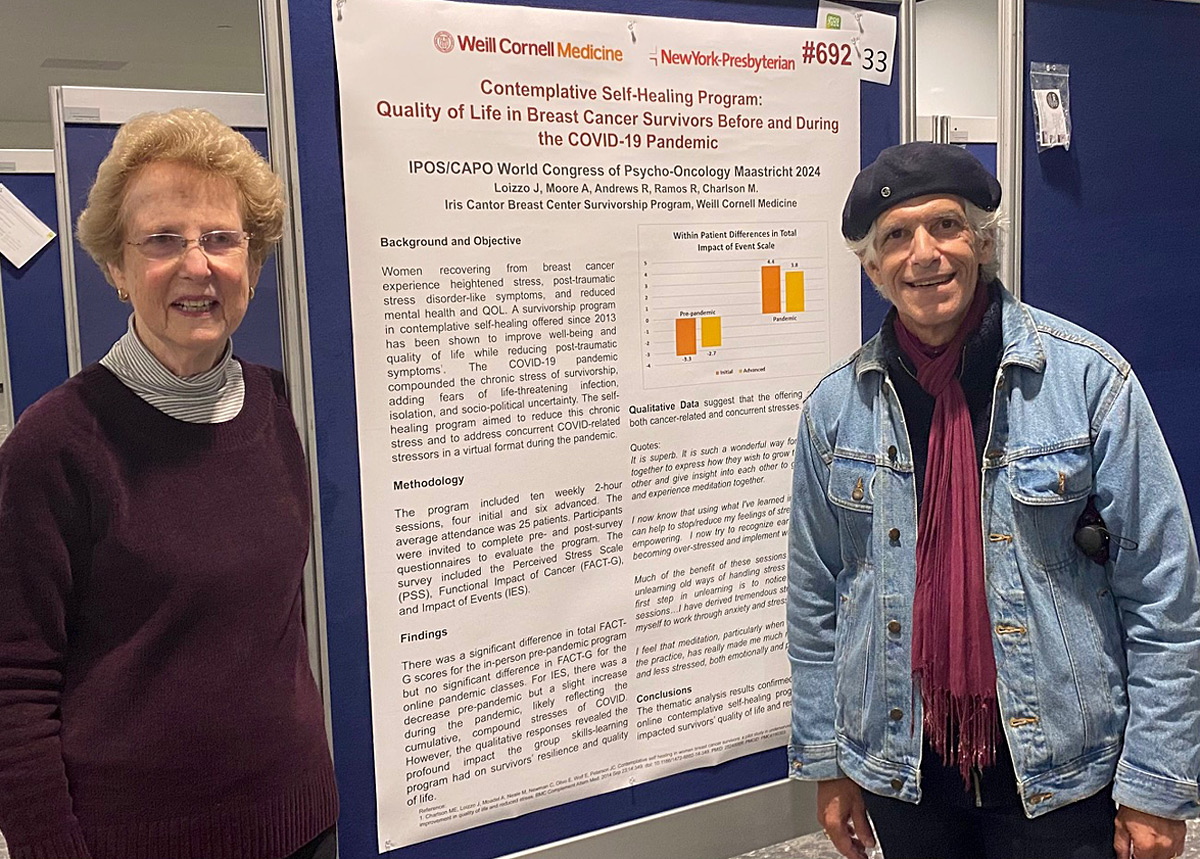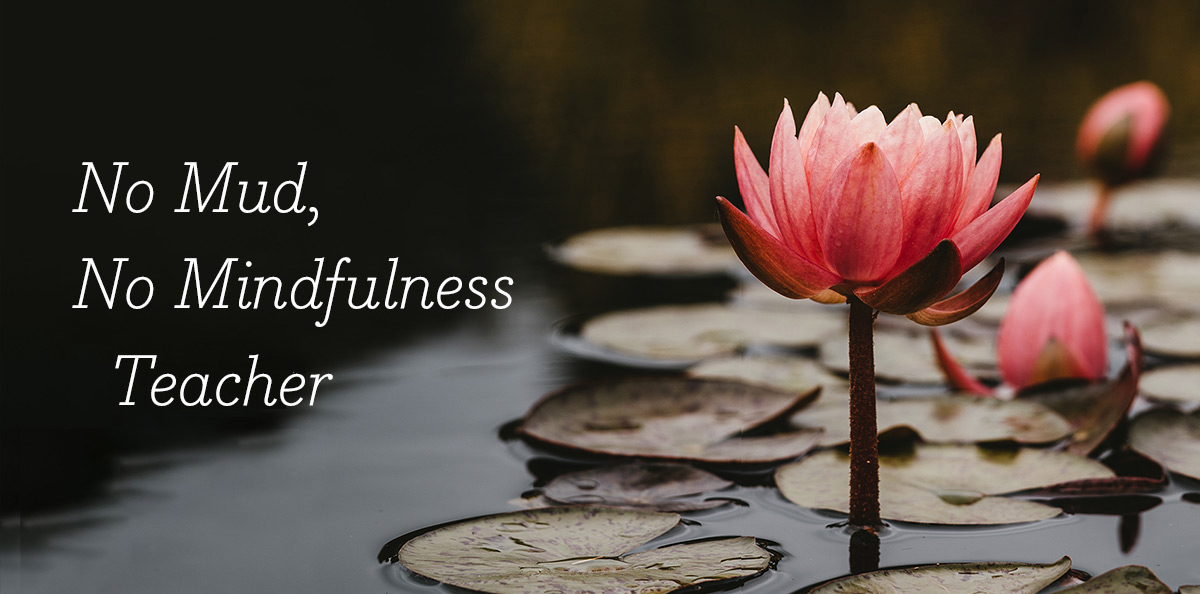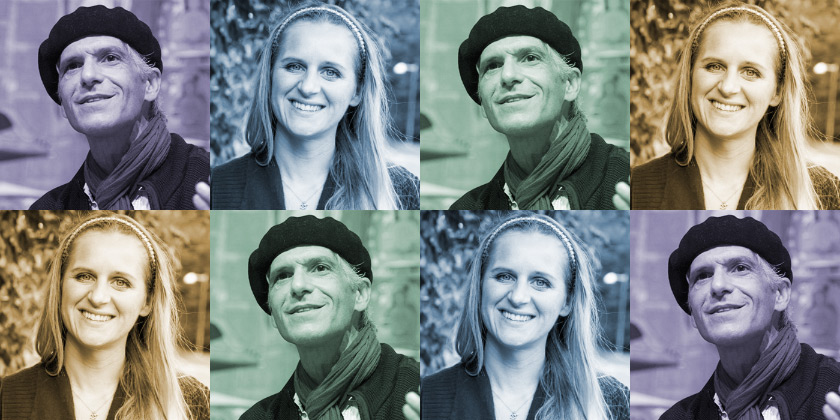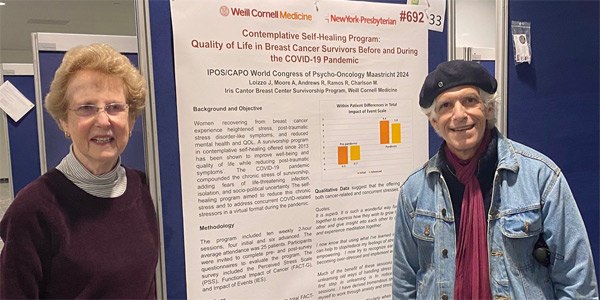by Joe Loizzo

For the last twenty years, it has been a privilege and a joy to lead a Program in Contemplative Self-Healing for breast cancer survivors at Weill Cornell Medical College in New York City. Despite dramatic gains in cancer care, most of these women struggle with post-traumatic stress syndrome after their treatment. This syndrome has long gone unnoticed and unaddressed by conventional oncology and makes their recovery far more challenging than it needs to be. In these groups, 25–35 women who have completed treatment learn and share together in an open healing community how mindfulness, compassion, imagery, and breath practices help them navigate the vital transition from simply surviving their cancer to thriving at a new level of well-being. It has been a transformative experience for me to be facilitating these groups of incredible women over the years, tasting the healing alchemy that takes place between them, and witnessing how some graduates have returned year after year to welcome anxious newcomers into their open and uplifting contemplative community.
This fall brought another opportunity for my research partner at Weill Cornell, leading oncologist Dr. Anne Moore and I to share the latest findings of the program with fellow cancer researchers from around the world. The conference, held in the charming Dutch city of Maastricht, was hosted by the International Psycho-Oncology Society, a unique organization that brings together mental health professionals and oncologists to go beyond simply treating cancer to improving the overall health, quality of life and well-being of the people living with and/or recovering from it. While the dedicated researchers and clinicians we met made the conference truly inspiring, it was sobering for us to confront once again how very far behind our U.S. medical system is in recognizing and seriously addressing this vital need.
Our poster presentation reviewed the research Dr. Moore and I have been doing over the years at the Breast Cancer Survivorship Program at the Iris Cantor Women’s Center at the Weill Cornell Medical College along with the rest of our team, Nalanda Institute board member Dr. Mary Charlson, Rosio Ramos, and Dr. Robin Andrews of the Weill Cornell Division of Epidemiology. The ten-week Contemplative Self-Healing Program based on the Compassion-Based Resilience Training (CBRT) I developed over 25 years ago at Columbia Presbyterian Hospital, has been found in multiple pilot studies conducted at Weill Cornell and Montefiore Einstein as of 2003 (see Editor’s Note below to read the pilot studies), to significantly improve the quality of life and reduce the post-traumatic stress symptoms of women recovering from breast cancer.
Our poster presentation also distilled the latest article to come out of our teamwork, showing that the program initially offered in person at Cornell has been effectively delivered online, co-hosted by Nalanda Institute, since the COVID 19 pandemic in 2020. The poster itself features some of the inspiring quotes of program participants, drawn from the qualitative analysis of their unstructured comments done by Dr. Andrews. Here are just a few of the comments participants shared about their experience in the program, which we included in the poster:
“It is superb. It is such a wonderful way for people to be together to express how they wish to grow to comfort each other and give insight into each other to gain knowledge and experience meditation together.”
“I now know that using what I’ve learned in the program, I can help to stop/reduce my feelings of stress. That is very empowering. I now try to recognize early on when I am becoming over-stressed and implement what I’ve learned.”
“Much of the benefit of these sessions has been about unlearning old ways of handling stress and anxiety. The first step in unlearning is to notice. Through these sessions…I have derived tremendous strength and faith in myself (and my ability) to work through anxiety and stress.”
“I feel that meditation, particularly when I have maintained the practice, has really made me much more self-reflective and less stressed, both emotionally and physically.”
My heartfelt thanks to Drs. Moore and Charlson for having the fierce compassion to champion and support this much-needed work for the last twenty years, and of course, to the hundreds of wise and brave women who have allowed me to accompany them on their journey to full recovery and greater well-being.
Editor’s Note:
If you’re interested in learning more and/or participating in this program, reach out to Rosio Ramos
Learn more about Weill Cornell’s Breast Center Survivorship Program
Check out the poster presented at the conference
Learn more about Nalanda Institute’s Compassion-Based Resilience Training (CBRT), upon which the Contemplative Self-Healing Program conducted at the Iris Cantor Breast Cancer Center Survivorship Program is based on, or about Nalanda Institute’s CBRT Teacher Training.
by Victoria Fontana

When I think about my path to becoming a Mindfulness and Compassion teacher, I am reminded of the many paths that converged from diverse points into the moment I realized that this was my calling. Life experiences, mentors, friends and contemplative teachings make up the landscape of my path. Here I share this journey with you.
I was a peacemaker by nature, with a keen desire to alleviate others’ suffering. Part of this was nature, and part was “nurture.” Unfortunately fortunate was the child who grew up in divorce and was desperate to keep those she loved at ease, keep the peace. I developed a massive radar for others’ dis-ease. This very trauma of a three-year relationship with daily dismay became bootcamp training for my often-criticized sensitivity to others’ emotions and well-being. My energies were misguided, and I was unaware that these efforts were my desperate attempt to survive and hold on to love.
by Anita Anandan

Editor’s Note: If you’re inspired by Anita’s story, please check out Compassion-Based Resilience Training (CBRT) / Teacher Training and become a certified CBRT Teacher. Find out more and register — the training begins May 25th!
In December 2021, I had a chance to teach Nalanda Institute’s Compassion-Based Resilience Training (CBRT), in a local prison. CBRT is an 8-week curriculum covering mindfulness, insight, compassion, mentor imagery along with breath and posture practices, complimented by Western scientific validation of these ancient practices.
Out of safety concerns during the pandemic, the prison arranged for me to communicate with the men remotely. The men gathered in a common space, and a video conference was used for the almost 80 men and I to communicate with each other. From time to time announcements reverberated through the space. Some of the men spoke Spanish, which I did not, and did not speak English, the language I used. But unwilling to let that deter them from fully participating, they brought a friend who interpreted between us.
By Nalanda Institute Editors
[metaslider id=”5327″]
As the year comes to a close, we’d like to take the time to share with you some highlights of all we’ve accomplished together throughout the year!
Late Winter. We brought in 2019 with a trifecta of inspiring courses and trainings: Yoga, Mind & Spirit Training, Sustainable Happiness Course in Compassion, and Meditation Teacher Training in Compassion.
Spring. In the spring, alongside our Toronto partner X-Hale, we successfully launched our new online Compassion-Based Resilience Training (CBRT) Teacher’s Program, with outreach worldwide; and graduated the NYC and San Francisco cohorts of our Contemplative Psychotherapy Program.

Editor’s Note: Nalanda Institute’s Director, Dr. Joe Loizzo recently sat down with Dr. Emma Seppälä for a conversation about compassion science and their hopes for the future. Dr. Seppälä is the Science Director at The Center for Compassion and Altruism Research at Stanford University. We present a small portion of their conversation here.
Dr. Seppälä is also our Guest of Honor at our 10th Annual Benefit on June 12th. Her talk entitled “Compassion Science: Healing Our Interconnected World” further explores the topics presented here. Find out more about our forthcoming benefit.
Joe Loizzo: Welcome, Emma, and thanks so much for taking the time to speak with me about your work in the science of compassion. First of all, maybe you could fill us in about how you found your way to your unusual career.
Emma Seppälä: While I was doing my master’s degree at Columbia in East Asian languages in the late 90’s, I took a class with Bob Thurman, and decided to focus on Buddhist Studies. That lead me to the seminar you gave on Science, Spirituality and Healing in the Tibetan tradition, where I remember you urged me to go to a talk at Union Seminary by Richie Davidson and Dan Goleman on meditation research, remember?
by Nalanda Institute Editors
[metaslider id=”4579″]
As this year of the Earth Dog comes to an end and we usher in the new year of the Earth Mother Pig, we are happy to look back at just a few of the amazing accomplishments of our community. 2018 has been a pivotal year in which we’ve evolved our teaching methods, deepened our community, and made our programs more widely available.
Extended captions and an elaboration of some of our programs and events in 2018:

